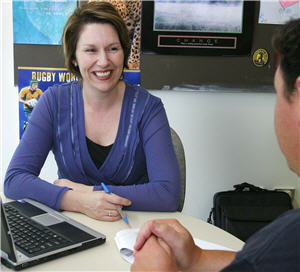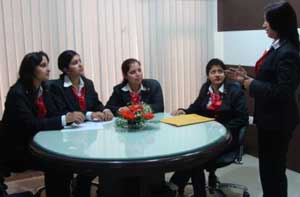Career Consultant
Tasks & duties

Career consultants may do some or all of the following:
-
support and offer guidance to people making life choices, which include education, training and work-related plans
-
talk with and question clients
-
provide support and guidance for clients using computer assisted career guidance packages and career resources, including handouts, books and videos
-
interpret career assessment exercises
-
help people identify skills and career values
-
assist people to develop their goals and action plans to progress their career decisions
-
advise on interview and job search strategies and techniques
-
assist people to develop a curriculum vitae (CV)
-
arrange work experience and job placements
-
run workshops on career planning, development, transitions and other relevant topics
-
collect and provide career and labour market information
-
write and produce a range of career-related publications
-
meet and talk with employers about workplace and employment issues
-
develop training programmes and assist educators or facilitators to run them
Skills & knowledge

Career consultants need to have:
-
excellent communication skills and effective counselling
-
teaching and training skills
-
knowledge of various counselling and assessment techniques
-
the ability to evaluate their clients' needs
-
up-to-date knowledge about education and training information
-
knowledge of local, national and global labour markets
-
an understanding of social, economic and cultural issues
-
knowledge of how organisations are structured (also known as organisational dynamics) and how they work best
-
an understanding of employment issues, such as Equal Employment Opportunities and recruitment strategies.
-
research skills, including skill using the Internet for research
-
report-writing and word processing skills
-
job searching skills
Entry requirements
To become a career consultant, a diploma or Masters in guidance counselling is recommended. However, degrees in fields such as psychology, human resource management, education, sociology or commerce are also useful.
Secondary education
An A or B Bursary is needed to enter further tertiary training. Useful subjects include English, Maori, history, graphics, economics and business studies.
Training on the job
Some employment and career guidance agencies have internal training programmes or use established seminars, courses or workshops to train and update staff. Independent career consultants usually attend seminars and conferences and undertake regular training to update their skills.
Useful experience
Useful experience for career consultants includes teaching, social work, vocational guidance, counselling, or an employment-related job such as human resource management or work for a recruitment agency.
Any volunteer work related to counselling may also be helpful.
Related courses
Career Development Programmes
Counselling
For more information, please refer to Career Services.
Document Actions
